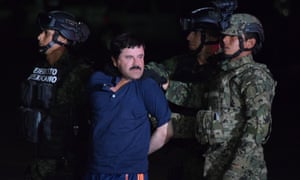Attorney general says Joaquín Guzmán’s fate partially sealed by his desire to make a film about his life

The fugitive drug lord Joaquín “El Chapo” Guzmán allegedly contributed to his capture by attempting to make a film about his rags-to-riches rise to the top of one of the world’s most extensive criminal enterprises, it has emerged.
While on the run, he tried to contact actors and producers in the hope of crafting his own film, only to reveal details of his whereabouts which contributed to his capture on Friday in Los Mochis, a town on the Pacific coast, Mexican authorities said.
The attorney general, Arely Gómez, made the claim as the Sinaloa cartel leader was paraded past media in Mexico City on his way back to the maximum security jail from which he staged a spectacular breakout last year, triggering a manhunt that culminated in a pre-dawn shootout with security forces that left Guzmán cornered in a hotel.
The US is reportedly lobbying for his extradition, creating a dilemma for Mexico’s government, which on Saturday was still celebrating the capture as a vindication of the embattled president, Enrique Peña Nieto, and state institutions. News agencies quoted Mexican sources suggesting that a request would be granted.
According to Gómez, the drug lord’s ego and desire to shape his public image contributed to his downfall by confirming he was hiding in Sinaloa, a strip of land that rises from the Pacific coastline to remote mountain ranges dotted with opium plantations and marijuana fields. “He established communication with actors and producers, which formed a new line of investigation.”
Investigators tracked the movements of Guzmán’s lawyers and their meetings with potential biopic participants, the attorney general added. She did not supply names or details.
If confirmed, it would reveal a degree of hubris similar to that of Pablo Escobar, the murderous and flamboyant Colombian drug lord whose life and death are chronicled in the Netflix series Narcos.
A joint police and military operation seized Guzmán at a hotel after a battle which left five dead and six captured, including the cartel leader who appeared dazed and grubby in photographs. Assault rifles, a rocket launcher and bulletproof vehicles were seized.
Peña Nieto, who was humiliated by the drug lord’s escape last July, trumpeted his recapture as a vindication of Mexico’s capacity, prompting speculation he wished to keep Guzmán in Mexico to prove the state was now able to keep him behind bars. “Today our institutions have shown that citizens can trust them,” the president told reporters at the national palace in Mexico City. “They have the stature, strength and determination to accomplish any mission that they are given.”
US officials are believed to want Guzman on a plane to the US where he would probably spend the rest of his life behind bars for trafficking cocaine and dominating the narcotics trade in the US.
Behind the scenes, US officials have started lobbying to get Guzmán on US soil, according to Gilberto González, an ex-DEA agent and director of the Narcotics Officers Association. “DEA Chicago, LA and El Paso want Chapo extradited. A push for extradition is under way.” The process will take time, not least because Peña Nieto needs to keep the drug lord in Mexico for an indefinite period, said González. “Peña Nieto needs to prove he can hold him.”
Guzmán’s lawyers had “lots of legal manoeuvres at play” but would struggle to block his eventual move north, he said. “The best way to kill a legend is to label him unimportant and extradite him to the US – let the US pay for prolonged incarceration. Peña Nieto will do what best restores his image in history and maintains the rule of law in Mexico.”The manner of Guzman’s capture, Gonzalez added, had dented the legend. “Chapo is no Pablo Escobar. He did not go down in a blaze of glory.”
The US filed an extradition request last June when the drug lord was in Altiplano prison, 56 miles outside Mexico City, supposedly under wraps since his capture by Mexican marines in Mazatlán in early 2014.
Mexico refused the request. The then attorney general, Jesús Murillo Karam, said Guzmán would be sent to the US only after he had served time for all his crimes in Mexico – in “about 300 or 400 years”. Analysts interpreted that as a desire to show autonomy from a neighbour often perceived as meddling and overweening.
Two weeks after the US request the prisoner escaped by squeezing through a hole in his shower floor and fleeing on a modified motorbike through a mile-long tunnel fitted with lights and a ventilation system, a spectacular breakout which made Mexican authorities look inept and corrupt.
His return to the same jail prompted jokes that his old cell was unavailable because it was being remodelled.
He had escaped from jail before, in 2001, reputedly in a laundry truck, and went on to dominate organised crime from his base in Sinaloa.
[Source:- the gurdian]
